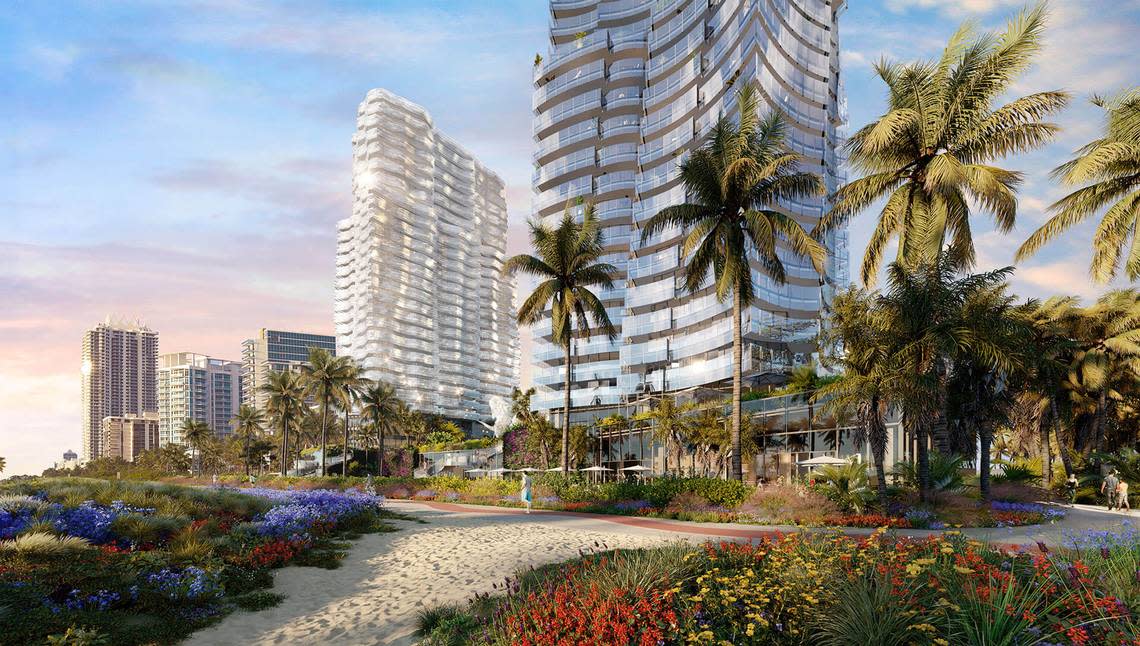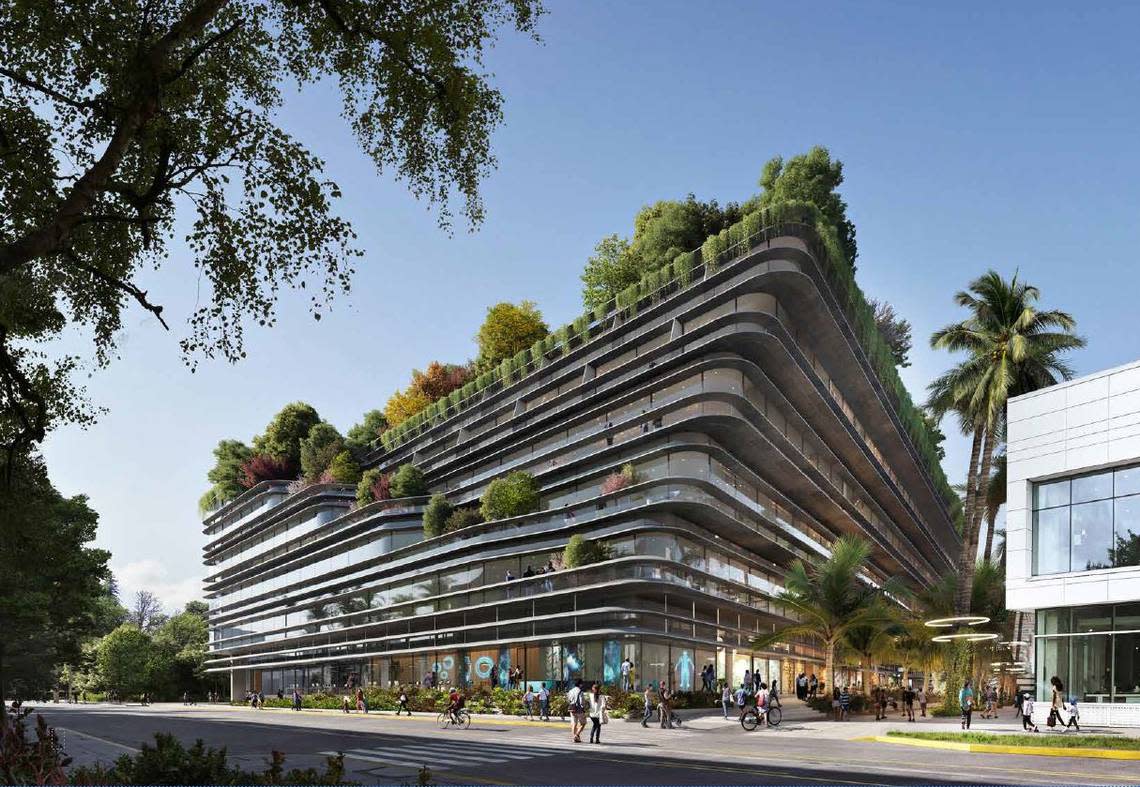Miami Beach voters reject Ross plan at Deauville site. Commission race heads to runoff
Miami Beach voters rejected ballot questions to allow a plan to build on the former Deauville Beach Resort site and to lease city-owned parking lots near Lincoln Road, according to unofficial results posted Tuesday evening, while Laura Dominguez and Sabrina Cohen are headed to a December runoff for city commission.
The failure of the Deauville and Lincoln Road items is a blow to Mayor Dan Gelber’s agenda and to several developers who had poured millions of dollars into promoting the measures.
Results
The Deauville question would have allowed Miami Dolphins owner and developer Stephen Ross to exceed current building-size regulations to bring a luxury condo tower and hotel to North Beach. The measure’s failure means the future of the site is unclear. The historic hotel, which has been shuttered for five years, is set to be imploded this weekend.
“I’m disappointed because that may end up being a desolate lot for decades,” Gelber told the Miami Herald. “I don’t think we’ll get a Gehry building there,” he added, referring to renowned architect Frank Gehry, who had partnered with Ross on the proposal.
Daniel Ciraldo — executive director of the nonprofit Miami Design Preservation League, which has fought to prevent the historic hotel’s demolition — said the Deauville can now be redeveloped “consistent with existing zoning.”
“Voters sent a clear message that there was not a sufficient public benefit for the [building-size] increase,” he said.
The Lincoln Road items consisted of two controversial 99-year leases of city-owned surface parking lots, where developers hoped to build mixed-use structures six to eight stories high with high-end office space.
Voters approved a separate item dictating how the city could have spent the rent from the two leases, but its passage is moot because the lease agreements were voted down.
“I think there’s trepidation about development, obviously, in parts of the city, and I think that was reflected in the vote,” Gelber said. “People are always cautious about development in our city and there’s a fear of the unknown.”
Miami Beach Commissioner Kristen Rosen Gonzalez, who led a campaign against the Lincoln Road items, said in a text message that “David beat Goliath” in the city.
“The people rejected these ballot measures that favor special interests over residents,” she said. “The people flexed their muscle.”
Five other Miami Beach ballot questions passed Tuesday, including a $159 million general-obligation bond for arts and culture facilities.
The preliminary results suggested that Dominguez and Cohen were headed to a Dec. 6 runoff for a Miami Beach City Commission seat after none of the five candidates to replace the late Mark Samuelian received a majority of votes.
Dominguez, who was Samuelian’s life partner, finished first in Tuesday’s voting and will face Cohen, a disability-rights advocate who placed second.
Stephen Cohen was in third place, followed by Mitch Novick and Isaiah Mosley.

The runoff winner will serve until 2025, when Samuelian’s term would have ended. Samuelian, 58, died in June of an illness.
Dominguez is a digital-marketing professional who had served as Samuelian’s campaign manager and treasurer.
Cohen runs a disability-rights nonprofit, the Sabrina Cohen Foundation, which has received support from the city of Miami Beach and developers and philanthropists. Last year, the city commission voted to match up to $2.5 million in donations to support construction of a recreation center for people with disabilities.
The two candidates represent opposite sides of a politically divided city.
Cohen was endorsed by Gelber and Commissioners Ricky Arriola and David Richardson, and her campaign was run by political consultant Christian Ulvert, an ally of Gelber.
Dominguez was backed by Rosen Gonzalez, who is the most vocal critic of Gelber, and Alex Fernandez.
Cohen and Dominguez each raised substantially more money than their opponents through campaign accounts and political committees.
Dominguez’s campaign has reported over $300,000 in contributions, including $175,000 that Dominguez loaned to her own campaign. A political committee for which Dominguez was soliciting donations, Coastal Communities Matter, has also raised $75,000.
Cohen’s campaign raised over $100,000, reports show, while a PAC that she chairs, Miami Beach Residents for Progress, has brought in just under $75,000.
Rosen Gonzalez has raised questions about whether Cohen’s nonprofit role could create a conflict of interest for Cohen as an elected official. Cohen has said she would follow the city attorney’s direction if she is elected, “including recusals from any official actions or divestments of any interests, if warranted.”
The ballot questions
▪ Question 1: The Deauville Hotel site
Voters shot down an increase in the allowable floor-area ratio — a method of regulating building size — at the site of the historic Deauville hotel in North Beach. Miami Dolphins owner and developer Ross, who pumped nearly $1.9 million into a PAC to support the ballot question, was expected to finalize his purchase of the property if the item passed and negotiate with the city on plans for a 125-unit luxury condo tower and a 175-room hotel. Now, it’s unclear what will come next for Ross’ plans or for the site.

▪ Question 2: Arts and culture general-obligation bond
The passage of this item authorized Miami Beach to issue up to $159 million in general-obligation bonds for capital improvements at arts and culture facilities. Among the earmarked funds are $29 million for the Fillmore theater, $20 million for the Bass Museum and $16 million for the Miami City Ballet. The cost in property taxes to an “average” homeowner will be $138 per year based on an average taxable value of $665,000, according to the city.
▪ Question 3: Voter approval for sale or lease of property in 41st Street corridor
The passage of this item means voter approval will be required before the city can sell or lease property for 10 years or more in an area from West 40th to 43rd Street between Pine Tree Drive and Alton Road. That area includes city-owned surface parking lots that support nearby businesses.
▪ Questions 4, 5 and 6: Property near Lincoln Road
Voters rejected two, 99-year leases of city-owned surface parking lots near Lincoln Road. Developers were looking to build mixed-use buildings six to eight stories high with high-end office space at 1664 Meridian Ave. and 1688 Lenox Ave. Had the leases been approved, the city would have been required to spend up to $355 million in rent over 99 years — or about $3.6 million per year on average — in equal portions toward workforce housing, public safety, and resiliency initiatives.

▪ Questions 7 and 8: Residential and office incentives South of Fifth
Voters approved these items, which offer building-size incentives for people who are owners in the South of Fifth neighborhood and use their properties for something other than hotels or short-term rentals. The passage of Question 7 is expected to lead to the conversion of the Marriott Stanton Hotel into a residential property. Question 8 incentivizes residential or office uses on Washington Avenue between First Street and Second Street. This could allow an existing office building at 119 Washington Ave. to expand its footprint.
